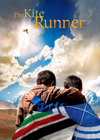 Director Marc Forster has brought Khaled Hosseini’s 2003 novel to the screen with magnificent cinematography (of China, not Afghanistan) and a story spanning the years 1978- 2000 as a fictional biopic of Amir (played by Khaled Abdalla). When the film begins, San Francisco in the year 2000, Amir is opening a box containing his latest book, but soon he receives a telephone call pleading with him to return to his longtime friend Hassan in Pakistan, who claims to be in ill health. The action then reverts to his childhood in Kabul, where he (played by Zekeria Ebrahimi) is growing up with his father Baba (played by Homayan Ershadi) absent his mother, who died in childbirth. His boyhood friend, also aged twelve, is Hassan (played by Ahmad Khan Mahmidzada), the presumed son of Ali (played by Nabi Tanha), the family housekeeper of forty years. Hassan, who stands up for Amir whenever challenged, is also an expert at flying kites, and the two collaborate one day to win a competition by cutting off all rival kites in town. On one occasion, an older teen tough, Assef (played by Elham Ehsas), and his two lieutenants challenge the two boys until Hassan loads a slingshot to ward them off. But on the day of the kite victory, the three reappear, corner Hassan, and rape him while Amir stays out of sight nearby. Thereafter, Amir has such mixed emotions about Hassan that he pretends that he has stolen his watch, a birthday gift, whereupon Hassan’s father decides to seek employment elsewhere, taking Hassan along. Soon, the Russians invade, so outspoken anti-Communist Baba takes Amir to Pakistan, and from there they move to America. But in time the Taliban ousts the Russians and establishes an even more repressive rule. The telephone call in 2000 from Pakistan is from an adult Hassan, who summons Amir not because of his health but instead to confess that he was actually Baba’s illegitimate son. Hassan pleads with Amir to save his own son Soraya (played by Ali Dinesh) from the Taliban, in particular from an adult Assef (played by Abdul Salam Yusoufzai). The Christmastime film release demands a happy ending despite Amir’s encounter with the horrors of Taliban-ruled Afghanistan, including the stoning of an adulteress, so filmviewers will feel relieved that The Kite Runner is not a “problem film.” Nevertheless, the political consciousness raising about Taliban rule merits a Political Film Society nomination for best film on human rights of 2007. MH
Director Marc Forster has brought Khaled Hosseini’s 2003 novel to the screen with magnificent cinematography (of China, not Afghanistan) and a story spanning the years 1978- 2000 as a fictional biopic of Amir (played by Khaled Abdalla). When the film begins, San Francisco in the year 2000, Amir is opening a box containing his latest book, but soon he receives a telephone call pleading with him to return to his longtime friend Hassan in Pakistan, who claims to be in ill health. The action then reverts to his childhood in Kabul, where he (played by Zekeria Ebrahimi) is growing up with his father Baba (played by Homayan Ershadi) absent his mother, who died in childbirth. His boyhood friend, also aged twelve, is Hassan (played by Ahmad Khan Mahmidzada), the presumed son of Ali (played by Nabi Tanha), the family housekeeper of forty years. Hassan, who stands up for Amir whenever challenged, is also an expert at flying kites, and the two collaborate one day to win a competition by cutting off all rival kites in town. On one occasion, an older teen tough, Assef (played by Elham Ehsas), and his two lieutenants challenge the two boys until Hassan loads a slingshot to ward them off. But on the day of the kite victory, the three reappear, corner Hassan, and rape him while Amir stays out of sight nearby. Thereafter, Amir has such mixed emotions about Hassan that he pretends that he has stolen his watch, a birthday gift, whereupon Hassan’s father decides to seek employment elsewhere, taking Hassan along. Soon, the Russians invade, so outspoken anti-Communist Baba takes Amir to Pakistan, and from there they move to America. But in time the Taliban ousts the Russians and establishes an even more repressive rule. The telephone call in 2000 from Pakistan is from an adult Hassan, who summons Amir not because of his health but instead to confess that he was actually Baba’s illegitimate son. Hassan pleads with Amir to save his own son Soraya (played by Ali Dinesh) from the Taliban, in particular from an adult Assef (played by Abdul Salam Yusoufzai). The Christmastime film release demands a happy ending despite Amir’s encounter with the horrors of Taliban-ruled Afghanistan, including the stoning of an adulteress, so filmviewers will feel relieved that The Kite Runner is not a “problem film.” Nevertheless, the political consciousness raising about Taliban rule merits a Political Film Society nomination for best film on human rights of 2007. MH
I
want to comment on this film